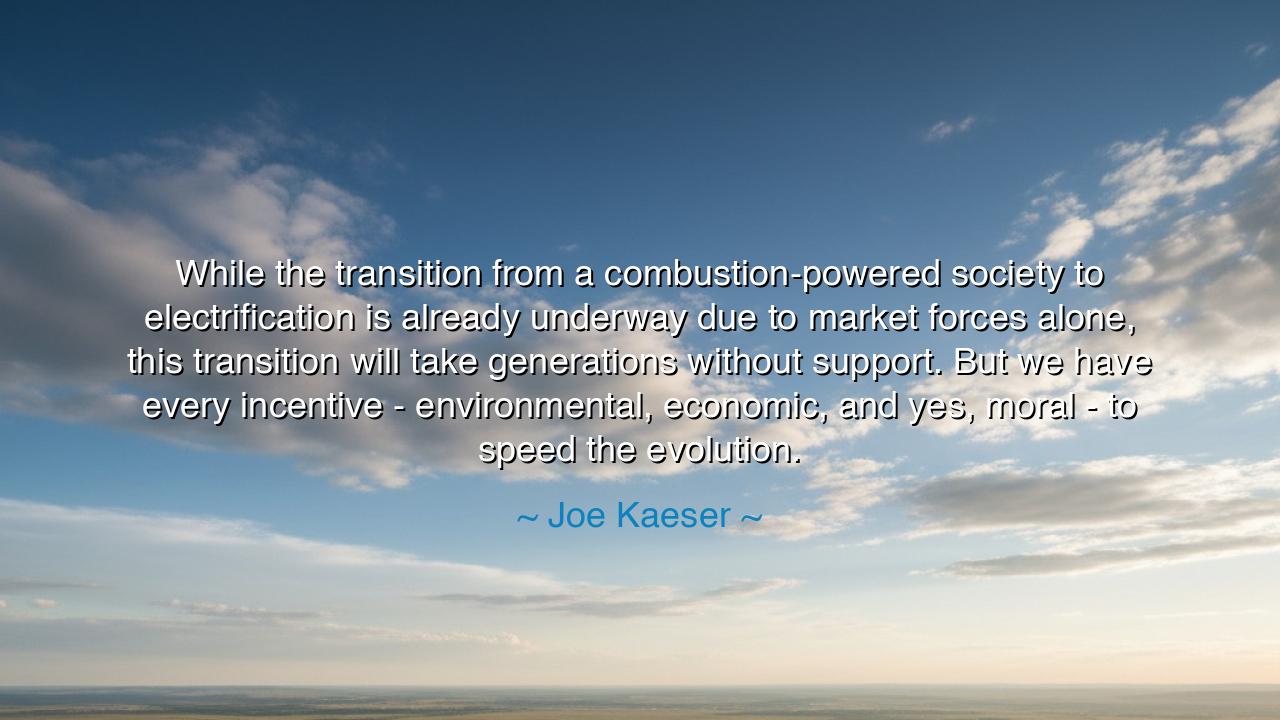
While the transition from a combustion-powered society to
While the transition from a combustion-powered society to electrification is already underway due to market forces alone, this transition will take generations without support. But we have every incentive - environmental, economic, and yes, moral - to speed the evolution.






Hear the words of Joe Kaeser, a leader of industry who looked beyond the present into the long arc of destiny, and who declared: “While the transition from a combustion-powered society to electrification is already underway due to market forces alone, this transition will take generations without support. But we have every incentive—environmental, economic, and yes, moral—to speed the evolution.” His voice is both a warning and a call to action, reminding us that change will come with or without us, but that wisdom demands we hasten it for the sake of earth and humanity.
The origin of this saying lies in Kaeser’s role as the CEO of Siemens, a company standing at the heart of energy, technology, and industrial transformation. He saw firsthand that the world, long powered by coal, oil, and gas, was beginning to shift toward electrification through renewables, smart grids, and new technologies. Yet he also knew that the invisible hand of market forces would move too slowly, bound by profit and inertia, unless guided by deliberate policy and the will of societies. His words were thus both prophetic and practical: urging governments, companies, and individuals to act not only for profit but for duty.
This is not the first time humanity has faced such a moment. Consider the story of the Industrial Revolution. For centuries, men relied upon muscle, wind, and water to power their lives. Then coal and steam remade the world, birthing railroads, factories, and global empires. But this transformation, though mighty, came at a terrible cost: blackened skies, poisoned rivers, and the chains of child labor in the mines. It took generations of struggle—laws, unions, and reformers—to turn progress into something that truly benefited the people. Kaeser reminds us that we now stand at a similar threshold: the rise of a new energy age. But unlike the past, we cannot afford to wait generations for balance to be restored; the stakes are too high.
The heart of his quote is in the threefold incentives he names. The environmental reason is plain: our burning of fossil fuels has scarred the earth, raised the seas, and heated the skies. To delay is to invite disaster upon our children. The economic reason is equally powerful: the industries of the future will not be in oilfields, but in solar farms, wind towers, batteries, and digital grids. Those who invest early will prosper; those who cling to the past will wither. And above all, the moral reason stands: we owe it to future generations not to leave them a dying planet for the sake of our convenience today.
History again shows us the power of moral choice. When America faced the scourge of slavery, there were those who argued that the economy could not survive without it. Yet the higher truth of human dignity prevailed, though it demanded struggle and sacrifice. Today, fossil fuels are the chains that bind us; they promise short-term wealth but long-term ruin. To abandon them is difficult, but to persist is immoral. Kaeser’s words echo this truth: our choices are not only technical or financial—they are moral, defining who we are as a people.
The lesson for us is clear: the transition is already in motion, but speed matters. Each year of delay multiplies the cost, deepens the damage, and narrows the hope. If governments support clean energy, if companies invest with courage, if citizens demand change and alter their own habits, then what might take generations can instead be achieved within decades. And in that swifter transition lies the salvation of both prosperity and planet.
And what of us, the ordinary souls who do not rule empires or command great companies? We too have a part. Choose energy wisely. Support leaders who hasten electrification, not those who cling to the smoke of the past. Conserve, plant, and demand cleaner technologies. Teach children that progress does not mean more consumption, but better stewardship. Each act may seem small, yet together they form the great current of history.
So remember the teaching of Joe Kaeser: the world will move from combustion to electrification with or without us—but with us, and with urgency, it can move swiftly enough to preserve life and hope. Act for the earth, act for the economy, act for morality. Let this be the age not only of technology, but of wisdom. For if we rise to this call, future generations will look back and say: they did not delay, they chose life, and because of them, we still thrive upon this earth.






AAdministratorAdministrator
Welcome, honored guests. Please leave a comment, we will respond soon